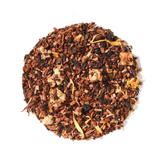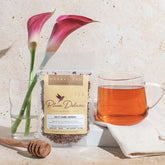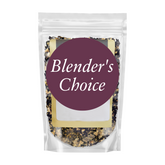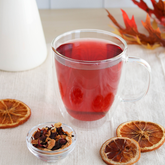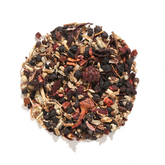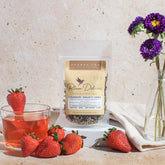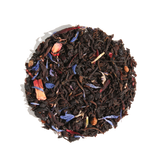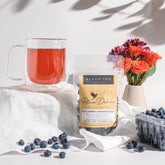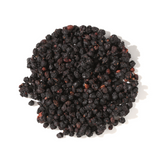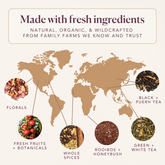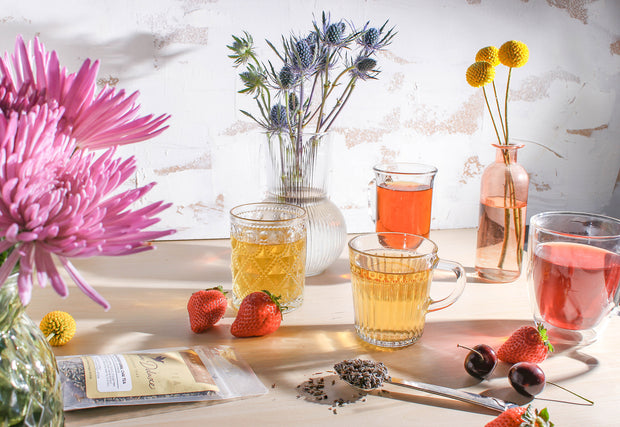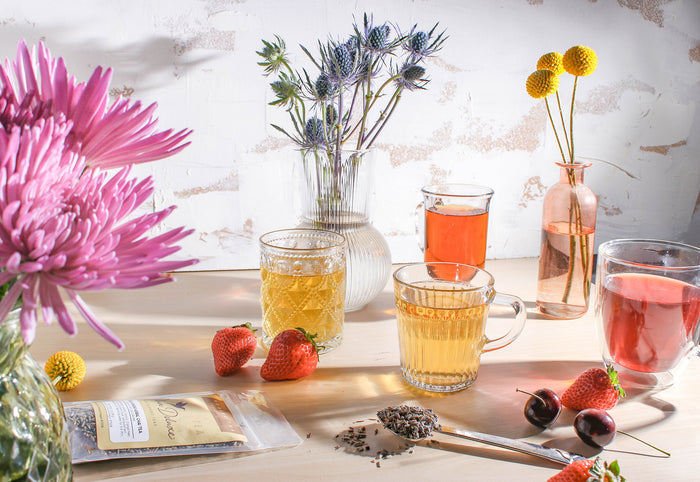As fall is upon us and the winter blues hang nearby, I like to prepare my mind and body for the changing seasons. It's never too late and never too early for some self-care tips!
What's better than some stress relief herbal tea, am I right? Right!
This article is all about self-care tips and stress-relief tea blends!
How Tea Can Help Support Your Mental Health
If we're too overloaded, too stressed, too tired, "too" everything, it affects our whole lives.
It takes over our mind and body and ability to function properly. It's time to steep up a fresh herbal tea cuppa knowledge and drink down some new self-care routines. It's time for stress relief tea!
Did you know, that stress relief hormones can be counteracted by herbal tea? The right tea can help lessen the effects of stress-related hormones (like cortisol) on the body because of tea's antioxidants and amino acids. These include I-theanine and epigallocatechin gallate, or EGCG for short.
A study conducted in May of 2022 on the correlation between drinking tea regularly and reducing depression was clear in stating, "...compounds present in tea may have the potential to aid in the prevention of depression or in its treatment as an addition to established therapies."
Furthermore, this same study proved some fascinating points in their aid to further prove a correlation between avid tea drinkers and reducing the symptoms of depression. They found that the aroma alone of black tea blends and green tea blends produced a psychological stress response. What a discovery!
It goes to show that beyond the effect that tea can have on the nervous system within our bodies, a warm and soothing cup of hot herbal tea (and its aroma even) can support relaxation, improve sleep quality, boost the immune system, and create a mild sedative effect. Each of these qualities within themselves is a gift, but as a multifaceted front, leads to astounding effects on the health of our minds.

Stress Relief Tea: Calming Herbs
It's all natural and all calming around here! Stress relief teas epitomize the essence of relaxation. Wondering what some of these magical calming herbs are and their health benefits? Let's look into it together!
First up is a favorite of mine—lavender!
What if I start with a really interesting fact? A study found that providing lavender oil (diluted to 1% concentration) to patients in an intensive care unit, "effectively ameliorates generalized anxiety comparable to 0.5 mg/daily lorazepam." That's how amazing this herb is!
The aroma, the ingestion, and the essence of lavender are magical on all fronts for our nervous system. It's been proven time and time again to help alleviate anxiety and mood issues.
When consumed as a tea blend, not only are you taking in the aroma's beneficial properties, but lavender tea can help with a variety of issues such as upset stomach, vomiting, abdominal swelling, and nausea. The benefits don't stop there: lavender is great for headaches, sores, and sprains as well.
Another wonderful calming herb is chamomile! Well known for its mild sedative effects it's a go-to herbal tea blend when I need to soothe my mind and body. For centuries chamomile has swept the board on a variety of uses both internally and externally.
Externally, chamomile is known to help treat a variety of rashes such as eczema, poison ivy, chicken pox, and diaper rash. A study found, "Chamomile flavonoids and essential oils penetrate below the skin surface into the deeper skin layers...", and "...this is important for their use as topical antiphlogistic (anti-inflammatory) agents."
Internally, it's a great warming blend of antioxidant properties as well! Chamomile can help with cardiovascular conditions, specifically heart disease, as well as a variety of upset stomach conditions like nausea, pain, ulcers, gas, and diarrhea. It has also proven helpful for the immune system and can help fight infections. It's even been studied as an aid in the prevention of osteoporosis.
Ever heard of valerian root? If you haven't, let me introduce you to this herbal remedy that has some wonderful anti-anxiety effects, promotes restful sleep, and has a refreshing taste.
According to a study on valerian root in treating sleeping problems, "Sleep plays a crucial role in maintaining brain functions...and chronic sleep problems could have a significant impact on our health. Insufficient sleep leads to reduced stress resilience, decreased quality of life, mood disorders, and cognitive, memory, and performance deficits." Guess what herb helps with this?
If you guessed valerian root, you got it!
Insomnia affects approximately one-third of the adult population, and it's more important than ever to get a good night's sleep and to take care of ourselves, our minds, and our bodies. Valerian tea before bed can help to offer a better sleep quality without the hangover effect.
It's a no-brainer in my books!
There are so many herbs and herbal teas that are phenomenal at doing what they do best; helping to take care of your body, whether it be relaxation, calming, easing anxiety, reducing inflammation, or helping keep the many other organs of our bodies running on track.
Next, we're going to explore a few of these a bit more!

The Benefits of Herbal Teas
As I mentioned before, herbal tea holds so many wonderful properties. While herbal teas and their benefits are more widely known in lavender herbal tea, classic chamomile tea, and tea with valerian root, there are a great many others that are top-class in my book!
Some of these include lemon balm tea, peppermint tea, mint tea, and tea with turmeric. There are also proprieties and beautiful indulgent elements to other tea blends that incorporate rose petals and cinnamon. What a soothing herbal tea blend to be had!
Traditionally lemon balm is used to help improve mood, decrease anxiety levels, and help with cognitive decline. However, more recent studies have proven that lemon balm is helpful with insomnia, gastrointestinal issues, and menstrual cramps, not to mention it's chalked full of antioxidant properties (of course!), that can help those who suffer from diabetes and cardiovascular diseases.
Ready to talk about peppermint tea and mint tea? These tea blends encompass all it means to wrap up in a relaxing blend that's ultra-designed to be "stress relief" in a cuppa!
Upset stomach? These teas have you covered! Bad breath? No problem—they've got your back! Looking for a naturally spicy-sweet pain reliever? The wonders these teas tackle in helping to reduce tense cranial muscles are superb! Not to mention they're a calming tea with a pleasant taste and (of course) packed with anti-inflammatory properties!
Turmeric is an herb that is fantastic to help treat anxiety and surrounding issues. Curcumin, the bioactive compound that is found in turmeric has been widely studied. It has been proven to be successful in helping to treat anxiety and depression, specifically by boosting serotonin and dopamine levels in the body.
When these levels get out of whack, this is what creates an imbalance in our brains and causes the symptoms of depression and anxiety that we experience.
The possibilities feel limitless and yet all infinitely attainable in our feat to combat stress and create a more profound sense of self and help create the ultimate mind and body connection.
With this newfound knowledge, you can tap into some amazing stress-relief powers by utilizing stress-relief herbal teas!
Brewing Suggestions for Herbal Teas
The brewing suggestions for herbal teas vary from what you traditionally experience with other tea varieties such as black tea or green tea. These different teas require more of an exact brew time because if you over-steep them, you can end up with a tea that is bitter or astringent. That is why it's vital to steep for the proper length of time and use the proper water temperature when brewing your tea.
When it comes to herbal teas, however, you typically brew for a longer length of time according to the general instructions included, and you're not "in over your head" (pun intended) if you accidentally leave the tea in for a bit too long. This goes back to the fact that herbal teas haven't gone through the same processes that green tea and black tea have in the oxidative process.
With herbal teas, you want to draw out their flavor and health benefits and you don't have to worry as much about the bitterness factor.
When it comes to herbal teas that include herbs like turmeric and chamomile, even ginger, it's a personal preference truly on how long you'd like to steep it for. The longer you steep, the more you're drawing out those health benefits we discussed. It will result in a stronger tea, but I have no complaints when I'm drinking down a soothing blend of stress relief tea!
If you're interested in learning more about herbal teas and how long to steep them, check this article from Erica Jolly on How Long to Steep Herbal Tea. It's a fantastic little 411 on herbal teas that is fun and informative. Enjoy!

Which Teas Are Best for Stress Relief?
Our Welsh Dreams herbal tea with its herbal blend of vanilla, lemon, and mint will leave you feeling satisfied, refreshed, and tranquil. It's not called 'Welsh Dreams' for no reason! It'll transport you to a faraway land where dreams really do come true!
The Night Cap herbal tea is perfect for what ails you at bedtime and will help you slip off into a peaceful state of mind and induce a serene slumber. Its pleasant taste is derived from organic peppermint, and valerian root, with a pinch of added goodness: lemongrass, hibiscus, rose hips, and chamomile. It'll have you counting sheep in no time!
Our Vanilla Sugar Dust is a great little addition to this tea if you're looking for an added compliment as well!
Ready for a little fun with chocolate? This Golden Cocoa herbal tea of warming spices is oh-so-yummy! Honeybush starts this tea off right with its naturally sweet and smooth flavor, then we throw in ample amounts of cocoa peel and cocoa nibs to give you that good dose of chocolate.
Just the right balance of turmeric pieces and a blend of other spices creates a warming blend that is not only caffeine free but can really give you that mental health boost!
It's a great tea to add some milk to as well if you're feeling like trying something new—try it hot or try it iced. Either way, it'll leave a resoundingly good impression!
The floral fun that's wrapped into our Calm Chamomile herbal tea leaves me breathless every time! I'm kind of a floral fanatic! This herbal tea blend can't get much more up my avenue with its beautiful colors, fragrant aroma, and intoxicating taste.
Calm Chamomile eloquently pairs rose and lavender tea. It's not complete quite yet—to take this herbal tea to the next level, it's blended with green rooibos, chamomile, lemongrass, and lemon balm. It is the epitome of stress relief tea, right?
Remember that "mint can take care of bad breath" joke I was making earlier? Well, I have just the tea for it! Refreshing "After Dinner" Mint Tea is the perfect tea for what ails you in this department. Peppermint, spearmint, ginger root, and clove pair beautifully to create this mint family tea! It's my go-to for an upset stomach, the common cold, or when I'm truly feeling overwhelmed or have a migraine. The natural vapors do wonders!
Easy Like Sunday Morning herbal tea gives you a divine balance and blends of floral and sweet! A unique blend of lavender and chocolate comes together to create a delicate and enticing song. it dances gracefully across your palate and plays harmoniously with your senses. Feel free to try a little splash of milk or cream for that added softness.
With Wise Counsel herbal tea you get the best of a few worlds: lemongrass, licorice, peppermint, ginger root, and for a touch of sweet—apple pieces. It's a crisp, cool mint tea that wraps up a good dose of "wind down" when you really need it. Feel free to add one of our honey sticks for a bit more sweetness!
Last, (but never least with tea choices) is our Meadow Walk herbal tea. From the ground up, this tea inspires passion, creativity, and fields of wonder. With blueberries, lavender, and rosemary, it's one of the best floral and berry tea blends.
For whatever ails you, there's a tea for that—steep, sip, and enjoy!
This content is not meant to be a substitute for professional medical advice, diagnosis, or treatment. All information resources found within this article are based on the opinions of the author. Always seek the advice of your physician or other qualified health providers with any questions you may have regarding a medical condition.
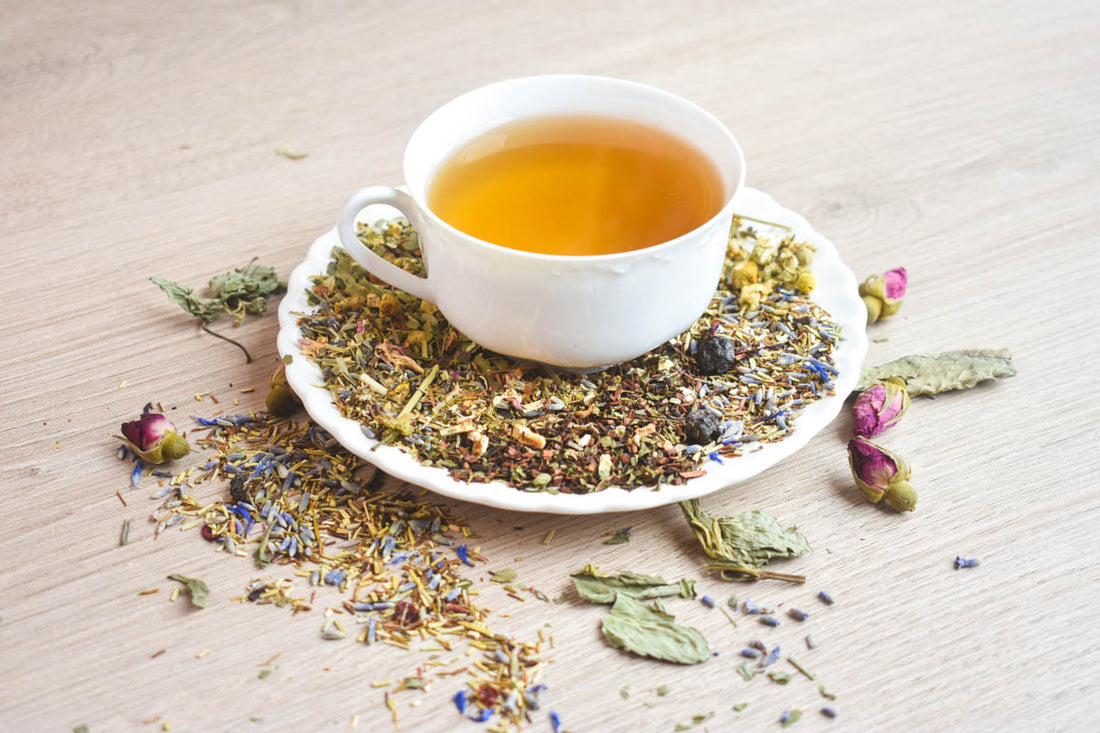
![Spring Break Tea Variety Pack [6-Pack Variety of Flavors]](http://www.plumdeluxe.com/cdn/shop/files/spring-break-pack.jpg?v=1740682266&width=165)

